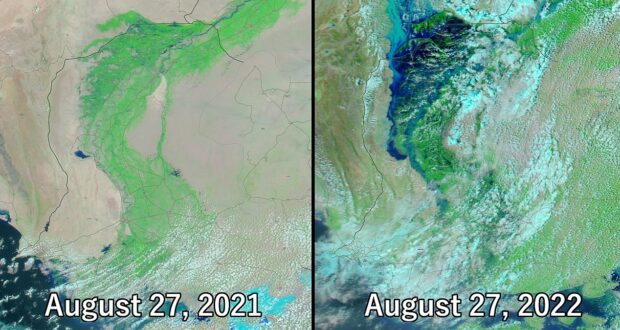7 December, 2022
Nawal Abdisamad, Research Assistant
Pakistan, the world’s fifth most populous country, is facing the devastating effects of global warming, but with most parts of the world choosing to ignore the disaster. The country received three times the average rainfall from May-August, a phenomenon linked to a record heatwave blamed on climate change. Between the years 1986 to 2015, Pakistan’s temperatures rose by 0.3 Celsius per decade, which is higher than the global average. This was compounded by Pakistan’s glaciers dissolving and evaporating at an unprecedented rate – again thought to be due to climate change. These two factors have unified and created a gigantic super flood that devastated the entire country.
This summer’s crisis in Pakistan was foreseeable. In May of this year, the Pakistani Meteorological Department reported that the forecast was for higher than the average rainfall in the country, but this vital piece of information fell on deaf ears due to the political disorder in the country. Recent history pointed to Pakistan’s vulnerability. The 2010 Pakistan floods – made more intense by the La Nina oceanic and atmospheric phenomenon – were similarly devastating. Yet despite this, little was done to invest in infrastructure to prepare for future flooding.
It is currently estimated that 1,717 people have died as a result of the flooding, although the total is likely higher. One-third of the cotton crop and 800,000 livestock were also lost. The overall economic losses as a result of the floods are an estimated $30bn. More than 33 million people have been internally displaced. Some parts of Pakistan were hit worse than others. In the Swat Valley in northern Pakistan, millions were substantially cut off from the rest of the world due to the heavy flooding and wrecked infrastructure. This resulted in their being a short supply of food, medicine, and power.
To make matters worse, the areas that have been devastated by the floods – roughly 72 districts – already had high levels of both poverty and impaired and delayed growth and development among children. Moreover, the floods have destroyed more than 17,000 schools in the Sindh region alone, and the few thousand schools remaining in the area are being used to house those families that have been displaced. The impact it has had on their education is unimaginable. There has also been a desperate attempt to scramble to protect the power supply with the impact of floods crippling electricity distribution, and local officials have been trying to safeguard important power stations that were supplying electricity to millions of Pakistani people.
The floods have also led to the outbreak of malaria which the government have scrambled to contain the spread of the disease. The World Health Organisation (WHO) have predicted 2.7 million malaria cases in 32 districts in flood-hit Pakistan by January 2023 which will be yet another disaster. With the fear of a second disaster striking Pakistan’s Health Minister has received nearly 6 million mosquito nets from India and has requested further aid from the WHO by seeking further mosquito nets. This is after Pakistan announced they themselves could not afford to spend even more on recovering from the floods, therefore calling for aid from the rest of the World. Pakistan’s climate change minister pled ‘for faster international help at the launch of a new United Nations(UN) appeal for aid’ resulting in the UN revising up its ‘humanitarian appeal for Pakistan fivefold’ from $160 million to $816 million.
The future of millions of lives is currently at stake in Pakistan. Calls for more aid and resources have been made in a desperate attempt to ensure the safety of those still alive. The long-term impact that Pakistan faces today is unmeasurable with so many lives lost, undermined peace and stability, and livelihoods being impacted.
There have been calls for aid, changes in policy, and more. Foreign countries and international organisations have helped with Pakistan’s situation and are working together for greater sustainability. The government has announced that they will set up a climate change task force that will respond to climate change and heat waves. For their part, the provincial and national governments are working together for energy conservation in the future. Furthermore, the mainstream political parties have taken the climate change debate seriously and have agreed that it is a threat to both Pakistan’s economic and social stability – they have seen what their inaction can do.
Image: a before and after satellite photo of the floods in Pakistan’s Sindh region (Source – NASA)
 Human Security Centre Human Rights and International Security Research
Human Security Centre Human Rights and International Security Research




